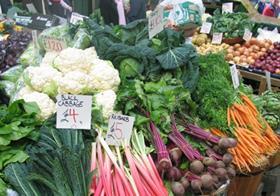
A decision to scrap existing European Union marketing standards on a range of fresh fruit and vegetables comes into force today (1 July), meaning the potential return of misshapen produce on supermarket shelves.
The move, which will apply to 26 different types of fresh produce, ispart of a European Commission plan to simplify regulations and cut red tape.
The products affected by the amendment were previously covered by Specific Marketing Standards, but from today will be covered by the General Marketing Standard, which is below the old class II standard.
As a result, food retailers will be allowed to market such items without having to label them as 'imperfect'.
The new standards apply toapricots, artichokes, asparagus, aubergines, avocados, beans, brusselsprouts, carrots, cauliflowers, cherries, courgettes, cucumbers,cultivated mushrooms, garlic, hazelnuts in shell, headed cabbage,leeks, melons, onions, peas, plums, ribbed celery, spinach, walnuts inshell, watermelons and chicory.
Marketing standards will remain in place for apples, citrus fruit,kiwifruit, lettuce, peaches, nectarines, pears, strawberries, sweetpeppers, table grapes and tomatoes. However, these products can beexempted if they are sold with a label clearly distinguishing them from'extra', 'class I' and 'class II' fruit.
European Commissioner for agriculture and rural affairs Mariann Fischer Boel said that the decision would not only cut down 'unnecessary red tape', but would also increase options during the current economic crisis.
'In these days of high food prices and general economic difficulties,consumers should be able to choose from the widest range of productspossible,' Ms Fischer Boel said. 'It makes no sense to throw perfectlygood products away, just because they are the 'wrong' shape.'
However, the decision to repeal the standards – which was made following a vote by EU member states in November last year – has met with criticism from some quarters.
In Italy, one of the fresh produce trade's leading figures said the revision of European fresh produce standards had gone too far.
'This is more than just a simplification of standards; this is real and proper deregulation which will end up creating confusion among consumers,' said Paolo Bruni, president of Italy's National Federation of Agricultural and Agri-Food Cooperatives (Fedagri-Confcooperative).
Mr Bruni argued that consumers would no longer be able to assess product quality at the point of sale by checking the category, size and level of ripeness.
'In the absence of rules on minimum standards governing the size and shape of an apricot, a melon or a courgette, we will be helping to proliferate the number of different demands retailers can make in terms of quality and price when signing supply deals,' he added.



